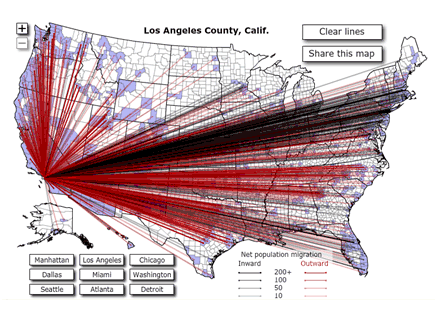Voting With One’s Feet
At some point companies and individuals decide their pain threshold has been exceeded and do something about it. They flee from the oppression and costs of unreasonable government to locations where they are treated better.
From Monty Pelerin’s World
Some people believe that banging your head against a wall is therapeutic because it feels so good when you stop. Even if one believes that, how long should one engage in such behavior? Is there an optimal time for best results?
An analogy to this head-banging in the business world is putting up with oppressive governmental rules and regulations. There is certainly pain associated with them, but no way to control when or if the pain stops. A different form of pain is picking up and leaving the jurisdiction where the pain is being inflicted. The costs and dislocation effects of doing so involve additional pain, but it is a way to stop banging your head against the wall. That is exactly the thought process that is under consideration (if not already underway) in thousands of businesses in the US.
Different industries in different locations suffer different levels of pain from regulations. Their relocation costs also differ. Heavily capitalized industries with highly skilled workers face greater relocation costs than other industries. As the regulatory burden increases, even the most expensive relocation moves eventually become “profitable.” At some point companies and individuals decide their pain threshold has been exceeded and do something about it. They flee from the oppression and costs of unreasonable government to locations where they are treated better. They stop banging their heads against the wall.
This process is known as “capital flight.” It includes human, monetary and physical capital. And it is underway in the US and has been for several years. It takes place both within the US, by moving operations from high regulation states to those with less regulation. It also takes place by moving operations outside the country.
Within the country the move is from high-tax, high regulatory states to lower ones. It is  businesses voting with their feet. Let’s call it the California effect or the New York effect. These states are not business friendly and losing jobs and businesses. Companies leave these states and move to the Sunbelt or overseas. Neither move is made for climate or health purposes as evidence shows the few low tax/regulation states in northern climate are gaining as well.
businesses voting with their feet. Let’s call it the California effect or the New York effect. These states are not business friendly and losing jobs and businesses. Companies leave these states and move to the Sunbelt or overseas. Neither move is made for climate or health purposes as evidence shows the few low tax/regulation states in northern climate are gaining as well.
Businesses don’t have to be pushed to losses to make relocation decisions. They have an obligation to their shareholders to move well before that point. As reported by Mish in an article from the Orange County Register:
“The decision by Waste Connections to relocate, despite the 17 percent revenue increase and the $18 million cost to move to Texas, illustrates that businesses will endure short-term costs to ensure long-term prosperity,” wrote state Sen. Mimi Walters, R-Laguna Niguel, in response to Steinberg’s message. Walters quotes business-relocation expert Joe Vranich of Irvine, who notes that businesses typically save 40 percent in costs by leaving California because of lower taxes and more manageable regulations found elsewhere.
Mish discusses conditions in California and Illinois with regard to their experience with business flight.
The same “voting with one’s feet” occurs with people who choose to leave the United States. Many renounce citizenship as a way to get away from the long arm of the Internal Revenue Service who believes all income, regardless of where earned, is subject to US taxation.
“Voting with one’s pocketbook” is also becoming popular. More citizens are placing money abroad. This is portfolio diversification rather than tax avoidance. Currency devaluation or possible confiscation are issues today whereas they were not in the past. As the practice becomes more prevalent, desperate government will likely impose strict capital controls to prevent citizens from protecting themselves.
Help Make A Difference By Sharing These Articles On Facebook, Twitter And Elsewhere:
